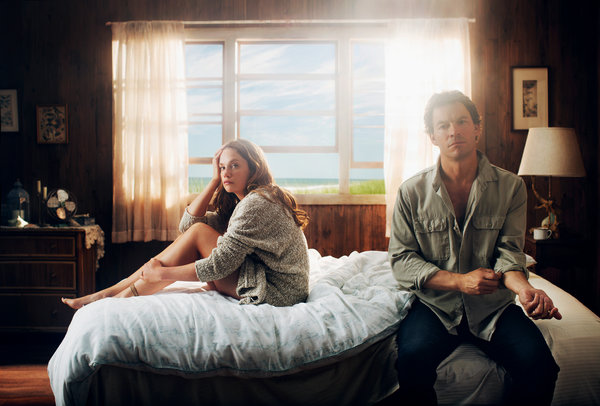 It’s a dream cast that fills the alluring new series “The Affair” (Showtime, 10 p.m.).
It’s a dream cast that fills the alluring new series “The Affair” (Showtime, 10 p.m.).
Dominic West (“The Wire,” “The Hour”) plays a writer and teacher, happily married to Maura Tierney (of “ER” and “Newsradio”), and with a gaggle of kids, who finds himself attracted to a waitress at a diner near their Hamptons beach home. Ruth Wilson, known from “Luther,” seems to be a professional temptress. But in this series, where she’s married to Joshua Jackson (“Fringe,” “Dawson’s Creek”) and trying to get over a family tragedy, she’s seen as both an aggressor and the recipient of unwanted moves by West’s character.
That’s because the story — a welcome adult series, free of superheroes, police and zombies — is told deliberately from both participants in the affair, one right after another. So after seeing their meeting unfold one way, we see how the other one perceived it, with details often so different they’re wearing different clothes. It all comes from the head of playwright Sarah Treem, who previously wrote psychologically minded dialog for “In Treatment.”
“We’re really interested in telling a story in a kind of Rashmomon structure,” Treem told reporters at the TV critics’ summer press tour, “because I think storytelling in general is driven by perspective, and there are two sides, at least, to every story.
“An affair seemed to be kind of like a love story on steroids,” she said. “You’re never privy to what your lover is thinking, even if you’re married to them. But when you’re having an affair, you don’t even have access to what your lover is experiencing when you’re not around. There’s this whole other world that they inhabit that you never get to see. So for the characters, that felt like kind of the richest situation to put them in if we really wanted to tell a story from two perspectives and really kind of play around to like how differently people can experience the same situation.”
It’s a way to peel apart gender differences as well, Treem says. “Men and women have different life narratives that’s very defined by biology, but different ways in which we see we think, of how to tell a story. So that was very much a part of how we were originally talking and conceptualizing this show.”
So writing the show with Hagai Levi, she said, “it was interesting even just having those initial conversations about two couples in an affair and whose side either of us were on. What I’ve tried to do really stringently in the writing of the show is not judge either character, though. We kind go of into it believing that these were two good people who were committed to their marriages, that they weren’t serial philanderers. They weren’t looking to destroy anybody else’s happiness. And they by chance, they’re both in very vulnerable places, and by chance, they meet somebody who they ultimately come to think is their true love. So what do they do? And I think the way that she handles it is different than the way he handles it because of their genders, but I think they’re both in the same situation. They both have the same problem.”
It was an odd task for Treem, in part because she just got married for the first time herself, amid the shooting of the first few episodes. But eventually, she got into the idea where every development had two different versions, largely because people remember things differently — “especially when something like panic takes over.”
“The Affair” begins with West’s character saying “When I look back, I can’t exactly tell you why it happened.” “And then he tries, based on his memory of events, to explain what happened,” Treem said. “And then she’s telling it based on her memory of events. And it’s different.
“Just in my experience in life, that’s true, that even people who are intimately involved with each other for years and years, if you go back and you ask them to tell the same story of something that happened, they will tell you two different stories. And they’re both convinced that they’re right. And they are both right.
“The objective truth, if it exists, is something that the viewer will decide for themselves. And I think what, hopefully, will happen, which is sort of exciting to me, is that the individual viewer brings their own experience to the show and their own feelings about infidelity or marriage or love and then comes up with their own truth about what happened between these two people. So it actually sort of becomes a triangle for each individual person.”
The premiere episode casts everything vividly, such that “they remember each other as looking better than they themselves look in their memory,” Treem said. “So that’s why, in his memory, her hair is blown out, she’s got a dress on, and in her memory of him, he’s got this what I think is a very nice button down shirt. He looked very handsome. He just remembers himself in a T shirt because that’s he doesn’t have sort of an elevated status in his own mind.”
Eventually, she said, “there will be a point in the series where you start to see another perspective, and you could perhaps assume that that perspective was the absolute truth, but I think that perspective will turn out to be unreliable as well.”
Treem said they set it in Montauk “because I kind of grew up out there, and I just loved it. So it’s to me, it’s a very romantic place. It’s a really it’s a place that exists in memory in my own head, and I think of this as a memory play.”
But since it is set there, class will be a big part of the story “and will play, actually, a much larger role as the season goes on.”